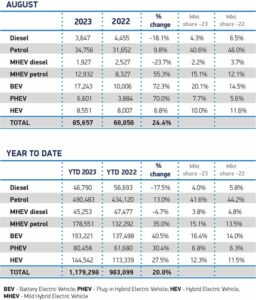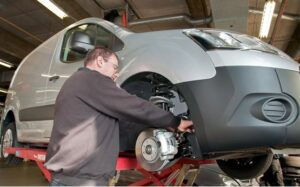
With over a third of all vehicle types now incorporating battery electric, hybrid and plug-in hybrid technology, UK car manufacturing is positioned for a sustainable future - if cash-strapped drivers are offered sufficient reason to buy, according to the chief executive of the Society of Motor Manufacturers and Traders (SMMT).
Speaking at the Automotive Industry Priorities 2024 webinar ahead of the latest UK manufacturing figures for 2023, Mike Hawes said electric vehicle volumes reached a record high in terms of volume in 2023 – although the market share slipped from 16.6 to 16.5%.
The SMMT is seeking government support to stimulate private consumer demand for electric vehicles and its preferred option would be to reduce VAT on electric vehicles which could potentially put an additional quarter of a million EVs on the road.
“When you look at diesel and mild hybrid diesel," Hawes said, "you've seen this erosion in demand there supplanted by growth especially in hybrid, plug in hybrid and battery electric vehicles. But if you look at the growth both in terms of the market and in terms of battery electric vehicles, that growth is driven by business and fleet. They have incentives, the private consumer does not which is why we are asking for governments to reduce VAT on electric vehicles from 20% as is now and halve it for three years, taking it down to 10%.
“To a certain extent, the Treasury has had a windfall from the shift towards EVs because these vehicles are some 30-40% more expensive. That means the VAT receipts are 30-40% greater for the Treasury. By giving some of that back to the consumer so we can stimulate the private market and it will get to where we want to be.”
Latest SMMT figures for 2023 show total UK vehicle manufacturing, at 1.04 million units, was the best year since the 2019 pandemic.
“Obviously, this is nowhere near where we were four or five years ago,” said Hawes, “but we've seen structural changes taking place in the industry. “What we've seen is obviously the supply chain issues recede. They haven't gone away but they have receded and that has enabled production to get back not - just in UK but in European terms - closer to where it was before the pandemic.
"The critical thing we need to grow the industry is to build up the supply chain. The UK actually produces just about every single component needed for an electric vehicle but we need to scale up and we need to scale up at pace because there's a tremendous opportunity there. When we think about some of the trade challenges around rules of origin, the importance of local production, not just the finished vehicle, but of the parts and components that go in there to meet those requirements is critical.”
Positivity
He spoke of a ‘complete change in positivity’ in manufacturing sentiment as a result of some £2.4bn worth of investments in gigafactories and EV production. “That's more than something like the last seven years put together. It has been a fantastic last year and the importance of that cannot be underestimated.”
"For many years securing investment for the UK was really challenging because we didn't know for four years while Brexit negotiations continued. We had political uncertainty, economic uncertainty. We now have a lot more stability.”
In terms of the impact of a forthcoming General Election, he said the industry view is that the UK remains a strong and a good place to invest and pointed out that of the £4.5bn of central funds destined for UK manufacturing, over £2bn went to automotive.
“We are not the biggest manufacturing sector in the UK but we got the lion's share of that money because the importance of this sector to net zero, to jobs, to security, to economic growth is recognised.”
“While the Conservative Government has established a set of policies which are the building blocks for supporting the industry, that's something that we obviously want to see continue whoever wins the next election. A lot of what Labour is saying would be an endorsement of what of what it is that we are seeking."
He noted that in October, the Labour Party published a plan for the automotive sector, the first of its sector plans. “If you read through it, it contains a lot of what we're asking for. Perhaps that is no accident because we've had very good engagement with Labour in the same way we've had very good engagement with ministers.”
“We see Labour doing things a little differently. It will want a more positive relationship with Europe and there's a chance to reset. Given that there'll be a change of parliament in Europe and potentially a change of government here, Labour may look at incentives to recommit to net zero.”
“Certainly, the engagement we've had with gives us a degree of encouragement should they form the next government. If they don't? Again, our engagement with ministers have been incredibly supportive.”
- SEO Powered Content & PR Distribution. Get Amplified Today.
- PlatoData.Network Vertical Generative Ai. Empower Yourself. Access Here.
- PlatoAiStream. Web3 Intelligence. Knowledge Amplified. Access Here.
- PlatoESG. Carbon, CleanTech, Energy, Environment, Solar, Waste Management. Access Here.
- PlatoHealth. Biotech and Clinical Trials Intelligence. Access Here.
- Source: https://www.am-online.com/news/manufacturer/2024/01/25/ev-incentives-critical-for-manufacturing-industry-renaissance-smmt
- :has
- :is
- :not
- :where
- $UP
- 1
- 16
- 2019
- 2023
- 2024
- a
- About
- accident
- According
- actually
- Additional
- again
- ago
- ahead
- All
- Although
- an
- and
- ARE
- around
- AS
- asking
- At
- automotive
- automotive industry
- away
- back
- battery
- Battery Electric Vehicles
- BE
- because
- been
- before
- BEST
- Biggest
- Blocks
- both
- Brexit
- build
- Building
- business
- but
- buy
- by
- CAN
- cannot
- car
- central
- certain
- chain
- challenges
- challenging
- Chance
- change
- Changes
- chief
- Chief Executive
- closer
- component
- components
- conservative
- consumer
- contains
- continue
- continued
- Core
- could
- critical
- Degree
- Demand
- destined
- didn
- diesel
- differently
- does
- doing
- don
- down
- driven
- drivers
- Economic
- Economic growth
- economic uncertainty
- Election
- Electric
- electric vehicle
- electric vehicles
- enabled
- Endorsement..
- engagement
- especially
- established
- Europe
- European
- EV
- Every
- evs
- executive
- expensive
- extent
- fantastic
- Figures
- First
- five
- FLEET
- For
- form
- forthcoming
- four
- from
- funds
- future
- General
- get
- given
- gives
- Giving
- Go
- gone
- good
- got
- Government
- government support
- Governments
- greater
- Grow
- Growth
- had
- Have
- haven
- he
- here
- High
- HTTPS
- Hybrid
- if
- Impact
- importance
- in
- Incentives
- incorporating
- incredibly
- industry
- Invest
- investment
- Investments
- issues
- IT
- ITS
- Jobs
- jpg
- just
- Know
- Labour
- Last
- Last Year
- latest
- like
- Lion
- little
- ll
- local
- Look
- Lot
- Manufacturers
- manufacturing
- manufacturing industry
- Manufacturing sector
- many
- Market
- market share
- May..
- means
- Meet
- mike
- mild
- million
- ministers
- money
- more
- Motor
- Near
- Need
- needed
- negotiations
- net
- next
- no
- noted
- now
- october
- of
- offered
- on
- Opportunity
- Option
- or
- Origin
- our
- out
- over
- Pace
- pandemic
- parliament
- parts
- party
- perhaps
- Place
- plan
- plans
- plato
- Plato Data Intelligence
- PlatoData
- plug
- policies
- political
- positioned
- positive
- potentially
- preferred
- private
- produces
- Production
- published
- put
- Quarter
- RE
- reached
- Read
- really
- reason
- receipts
- recognised
- record
- reduce
- relationship
- remains
- Renaissance
- Requirements
- result
- road
- rules
- s
- Said
- same
- saying
- Scale
- sector
- securing
- security
- see
- seeking
- seen
- sentiment
- set
- seven
- Share
- shift
- should
- show
- since
- single
- So
- Society
- some
- something
- Stability
- stimulate
- strong
- structural
- sufficient
- supply
- supply chain
- support
- Supporting
- supportive
- sustainable
- sustainable future
- T
- taking
- Technology
- terms
- than
- that
- The
- The Lion
- the UK
- There.
- These
- they
- thing
- things
- think
- Third
- this
- those
- three
- Through
- to
- together
- Total
- towards
- trade
- Traders
- treasury
- tremendous
- types
- Uk
- Uncertainty
- units
- us
- VAT
- Ve
- vehicle
- Vehicles
- very
- View
- volume
- volumes
- want
- was
- Way..
- we
- webinar
- went
- were
- What
- when
- which
- while
- whoever
- why
- will
- windows
- Wins
- with
- worth
- would
- year
- years
- you
- zephyrnet
- zero












